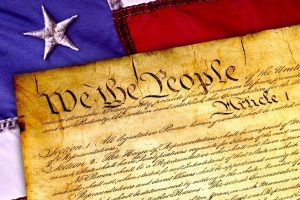The issue of reparations has lately become a fairly significant part of our national conversation. The fact that we are even discussing this in 2019 shows that the legacy of the enslavement of African Americans still persists – 156 years after the Emancipation Proclamation,  154 years after the end of the Civil War and the ratification of the 13th Amendment, 151 years after the 14th Amendment, 65 years after Brown v. Board of Education of Topeka, and 54 years after the signing of the Voting Rights Act.
154 years after the end of the Civil War and the ratification of the 13th Amendment, 151 years after the 14th Amendment, 65 years after Brown v. Board of Education of Topeka, and 54 years after the signing of the Voting Rights Act.
In this and our next post, we will examine three aspects of the legacy of slavery and its aftermath – the issue of reparations, the “Lost Cause” narrative, and controversies around Confederate symbols and monuments in the South. This is not to ignore the heritage of racism and discrimination in the North and other parts of the country – we are all culpable to some degree – but rather to highlight current phenomena that may be less well-known, perhaps especially less well-known by those of us who are white. As “majority” Americans, it is among our responsibilities to educate ourselves about trends in our society that negatively impact descendants of slaves (as well as other people of color) and to find ways to offset those negative impacts. This is not to instill a “guilt trip” – making (white) people feel ashamed, defensive or angry is rarely productive – but rather to educate, enlighten and spur to action for the common good.
Current Discussion of Reparations
While there is yet no consensus on what reparations might entail, the recent spate of white supremacist violence signals to many Americans that this issue – however reparations might ultimately be configured – is timelier than ever. Data shows (and has shown for quite awhile) that African Americans are woefully behind white Americans economically despite affirmative action laws, Civil Rights progress, and anti-poverty initiatives.  Sadly, the combined legacy of slavery, the shortcomings of Reconstruction, the rise of Jim Crow laws and the Ku Klux Klan, especially in the South, systemic and institutional racism, the uneven enforcement of laws to fight discrimination, and the shootings of unarmed black men by police officers shows that, in the end, our “original sin” of slavery still poisons our entire society.
Sadly, the combined legacy of slavery, the shortcomings of Reconstruction, the rise of Jim Crow laws and the Ku Klux Klan, especially in the South, systemic and institutional racism, the uneven enforcement of laws to fight discrimination, and the shootings of unarmed black men by police officers shows that, in the end, our “original sin” of slavery still poisons our entire society.
A dictionary definition of “reparations” is “the making of amends for wrong or injury done: reparation for an injustice.” Often used in conjunction with war, reparations can also mean “compensation in money, material, labor, etc., payable by a defeated country to another country or to an individual for loss suffered during or as a result of war.” Unfortunately, as Conor Friedersdorf notes in a recent Atlantic article (and quoting Wikipedia), “When average Americans hear reparations, they still think of ‘the idea that some form of compensatory payment needs to be made to the American descendants of slaves.’” Obviously writing a check to descendants of slaves is completely unworkable.
Thus we need to look at the concept differently. (First, we should note up front that there is a segment of our culture – generally speaking, white supremacists – who do not even acknowledge that there is a problem – or rather that there is a different problem. Many of these Americans on the far right of the religious and political spectrum feel that “their” country, of white heritage, is being taken or stolen from them by liberals, people of color, illegal immigrants, and others. Here we will not address those Americans but rather the minority of Americans overall – perhaps 26% – who do not believe in the need for reparations and others who are interested in learning more.)
The issue of reparations has been around for awhile, but it came into especial prominence with the 2014 article by author and journalist Ta-Nehisi Coates in the Atlantic. Among the many heart wrenching, devastating observations Coates makes in this evidence-based article is this: “With segregation, with the isolation of the injured and the robbed, comes the concentration of disadvantage. An unsegregated America might see poverty, and all its effects, spread across the country with no particular bias toward skin color. Instead, the concentration of poverty has been paired with a concentration of melanin. The resulting conflagration has been devastating.”
 Coates has been interviewed further in recent months about the Atlantic article, and he also testified on reparations before the House Judiciary Subcommittee on the Constitution, Civil Rights, and Civil Liberties on “Juneteenth,” June 19th. In a June 2019 New Yorker article, Coates argued that reparations are needed because “virtually every institution with some degree of history in America, be it public, be it private, has a history of extracting wealth and resources out of the African-American community… [B]ehind all of that oppression was actually theft. In other words, this is not just mean. This is not just maltreatment. This is the theft of resources out of that community.”
Coates has been interviewed further in recent months about the Atlantic article, and he also testified on reparations before the House Judiciary Subcommittee on the Constitution, Civil Rights, and Civil Liberties on “Juneteenth,” June 19th. In a June 2019 New Yorker article, Coates argued that reparations are needed because “virtually every institution with some degree of history in America, be it public, be it private, has a history of extracting wealth and resources out of the African-American community… [B]ehind all of that oppression was actually theft. In other words, this is not just mean. This is not just maltreatment. This is the theft of resources out of that community.”
 In the 2020 presidential campaign, several of the Democratic candidates support some form of reparations, and there are in fact pro-reparations bills being proposed in Congress. Here are some of the opinions and suggestions about reparations among the “top tier” presidential candidates, listed in alphabetical order:
In the 2020 presidential campaign, several of the Democratic candidates support some form of reparations, and there are in fact pro-reparations bills being proposed in Congress. Here are some of the opinions and suggestions about reparations among the “top tier” presidential candidates, listed in alphabetical order:
- Sen. Cory Booker of New Jersey was one of the prominent persons, in addition to Coates, who testified in favor of reparations in Congress on Juneteenth. Speaking passionately about recent shootings of black men in his own neighborhood, Booker said, “I look at communities like mine, and you could literally see how communities were designed to be segregated, designed based upon enforcing institutional racism and inequities.”
- Mayor Pete Buttigieg of South Bend, Indiana,
 suggests “a commission to propose reparations policies for Black Americans and close the racial wealth gap… America must enter a new era that promotes political, economic, social, and racial equity in part by specifically reversing the harms of racist policies and practices.” (Full text of his proposal here, on his website.)
suggests “a commission to propose reparations policies for Black Americans and close the racial wealth gap… America must enter a new era that promotes political, economic, social, and racial equity in part by specifically reversing the harms of racist policies and practices.” (Full text of his proposal here, on his website.) - Candidate Julián Castro, former Secretary of Housing and Urban Development, has proposed creating a commission “to explore the possibility of reparations for slavery.” He makes the moral argument that, “even though we weren’t there in past generations [such as fighting in wars or marching for voting rights], we’ve inherited a lot of moral assets, but you know what? We’ve also inherited some moral debts, and one of those debts we’ve never paid is the debt for that original sin of slavery.”
- Sen. Kamala Harris of California in March 2019 floated the idea of “funding for mental health treatment as a form of reparations for slavery.”
- While not in favor of necessarily paying reparations, Sen. Bernie Sanders of Vermont has recently stated that, “if elected president he would sign a bill creating a commission to study the issue of reparations for slavery.”
 Sen. Elizabeth Warren of Massachusetts strongly supports reparations and the bill proposed in the House of Representatives (see below). Believing that housing discrimination is a major problem for African Americans, Warren has also “released a sweeping affordable housing bill called the American Housing and Economic Mobility Act. The bill would dramatically increase the federal government’s investment into affordable housing — $450 billion over 10 years.”
Sen. Elizabeth Warren of Massachusetts strongly supports reparations and the bill proposed in the House of Representatives (see below). Believing that housing discrimination is a major problem for African Americans, Warren has also “released a sweeping affordable housing bill called the American Housing and Economic Mobility Act. The bill would dramatically increase the federal government’s investment into affordable housing — $450 billion over 10 years.”
Only Former Vice President Joe Biden among the top Democratic candidates has not yet made a commitment on the reparations issue. According to a campaign spokesperson, he “believes that we should gather the data necessary to have an informed conversation about reparations, but he has not endorsed a specific bill.”
 Perhaps not surprisingly, Majority Leader Sen. Mitch McConnell of Kentucky dismisses the issue of reparations, saying, that “none of us currently living are responsible” for slavery. Other Republicans expressed similar opinions and misgivings.
Perhaps not surprisingly, Majority Leader Sen. Mitch McConnell of Kentucky dismisses the issue of reparations, saying, that “none of us currently living are responsible” for slavery. Other Republicans expressed similar opinions and misgivings.
Legislation about reparations has been introduced in the House every year since 1989, first – a Commission to Study and Develop Reparation Proposals (HR 40) – by Rep. John Conyers (D-Mich.). The bill “calls for a federal study into the long-term damage Jim Crow era segregation policies and slavery have had on African-American communities.” This bill has stalled every year, but a new version, which establishes a Commission to Study and Develop Reparation Proposals for African-Americans, has recently been introduced by Rep. Sheila Jackson Lee (D-Texas) and has gained the support of new members of Congress, Rep. Alexandria Ocasio-Cortez (D-N.Y.) and Rep. Rashida Tlaib (D-Mich.). Jackson Lee’s proposed “commission shall examine slavery and discrimination in the colonies and the United States from 1619 to the present and recommend appropriate remedies. Among other requirements, the commission shall identify (1) the role of federal and state governments in supporting the institution of slavery, (2) forms of discrimination in the public and private sectors against freed slaves and their descendants, and (3) lingering negative effects of slavery on living African-Americans and society.”
The Reverend Mark Thompson, a member of the National Coalition of Blacks for Reparations in America, offers a helpful way to understand reparations as we move forward in this important conversation: “For many of us, reparations means spiritual repair, cultural repair, repair through the means of education, health, economics, society, all of those things together. So it’s obviously more than individual checks, but helping to build institutions so that at least African Americans can catch up with white Americans.”
In our next post we will follow up our look at reparations by examining two phenomena related to slavery that continue to influence racial issues in our time. The so-called “Lost Cause” narrative is a mythology that idolizes people who fought against the United States in order to preserve slavery, and several states and communities, especially in the South, are grappling with the existence of Confederate symbols and monuments in public spaces and the controversial question of what to do with them. The hope is that by engaging these topics with facts and constructive suggestions we can take small steps toward the healing of racial divisions in our nation.
